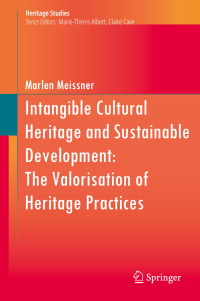
Marlen Meissner
Based on Pierre Bourdieu’s ‘Theory of Practice’ this book reflects and discusses the developmental potentials of intangible cultural heritage as formulated in the 2003 Convention. The Convention interprets intangible cultural heritage as ‘driver’ and ‘enabler’ of development, implying paradigms of sustainable and human development. This includes that intangible cultural practices hold potentials for growth-based sustainable development as well as for human development in the broadest sense. This publication systemises the developmental potentials of intangible cultural heritage to support their active valorisation. The theoretical approach is complemented by an empirical case study on the ‘Finsterwalder Sängerfest’, a German choral tradition. The main result of this work is a model for the valorisation of heritage practices which illustrates the interrelation between intangible heritage and sustainable as well as human development. Moreover, the model exemplifies how the goals of the 2003 Convention may be implemented beyond a UNESCO nomination.
Download: Flyer
Published in 2021.
This Book on springer.de: https://www.springer.com/book/9783030799373
The complete Series “Heritage Studies Series“ on springer.de.
TABLE OF CONTENTS
-
- Introduction
- The 2003 Convention in the Context of Sustainable Development
- Off to New Shores: From Tangible to Intangible and Sustainable
- Intangible Cultural Heritage and Sustainable Development: Retracing a Vague Relationship
- Sustainable Development in the ‘Operational Directives for the Implementation of the Convention for the Safeguarding of the Intangible Cultural Heritage’
- Intangible Cultural Heritage and Social Sustainability
- Intangible Cultural Heritage and Economic Sustainability
- Intangible Cultural Heritage and Environmental Sustainability
- Intangible Cultural Heritage and Peacebuilding
- Heritage Practices and Development: State of the Art
- Pierre Bourdieu’s ‘Theory of Practice’
- Bourdieu’s ‘Theory of Practice’: Background and Application
- ‘Subjectivist’ Influences
- ‘Objectivist’ Influences
- Overcoming the Opposition Between ‘Subjectivism’ and ‘Objectivism’
- Bourdieu’s Concept of the Habitus
- The Historicity and the Hysteresis of the Habitus
- Unconscious Incorporation of the Habitus
- Class Versus Field
- Cultural Practices as Mirrors of Social Structures
- The Forms of Capital
- Economic Capital
- Social Capital
- Cultural Capital
- Symbolic Capital
- Capital
- Contemporary Reception and Criticism
- Bourdieu’s ‘Theory of Practice’: Background and Application
- Intangible Cultural Heritage in the Light of Bourdieu’s ‘Theory of Practice’
-
- Case Study: The Finsterwalder Sängerfest
- History of the Finsterwalder Sängerfest
- The Finsterwalder Sängerfest 2016
- Contents of the Questionnaire
- Results of the Questionnaire and Procession of Data
- Intangible Cultural Heritage as Cultural Capital
- Intangible Cultural Heritage as Incorporated Cultural Capital
- Intangible Cultural Heritage as Objectified Cultural Capital
- Intangible Cultural Heritage as Institutionalised Cultural Capital
- Case Study: The Finsterwalder Sängerfest
-
- The Valorisation of Intangible Cultural Heritage
-
-
-
- ‘Enabling’ Development: The Practice of ICH and the Formation of the Habitus
- ‘Driving’ Development: The Practice of ICH and Conversions of Capital
- The ‘Conversion’ of ICH Practices into ‘Social Capital’
- The ‘Conversion’ of ICH Practices into ‘Economic Capital’
- Model of ICH Valorisation
-
-
-
- Conclusion
More from Heritage Studies Series
- Cultural Heritage Protection in Korea – Contents of Law and Policy and their Changes in Relation to International Conventions
- Handbook on Intangible Cultural Practices as Global Strategies for the Future
- Claiming Back Their Heritage: Indigenous Empowerment and Community Development through World Heritage
- Dance Practices as Research – Approaches to the Safeguarding and Transmission of the Intangible Cultural Heritage of Dance
- 50 Years World Heritage Convention: Shared Responsibility – Conflict & Reconciliation
- A Metamodel for Heritage-based Urban Development – Enabling Sustainable Growth Through Urban Cultural Heritage
- The UNESCO Memory of the World Programme: Key Aspects and Recent Developments
- Going Beyond – Perceptions of Sustainability in Heritage Studies No. 2
- Perceptions of Sustainability in Heritage Studies
- 40 Years World Heritage Convention
- Understanding Heritage
